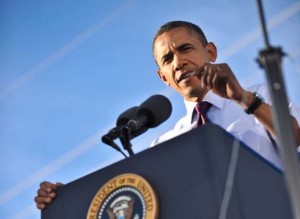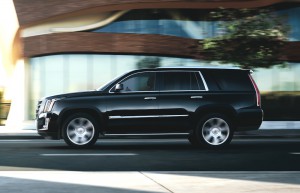
President Barack Obama toughened fuel economy standards in 2012 to their current federally mandated level of 54.5 mpg by 2025.
A new poll by the Natural Resources Defense Council indicates that more than three quarters of Americans believe the federal government should raise fuel economy standards for automakers.
Arguments over the fuel economy standards have raged ever since the Arab Oil Embargo of 1973, but the debate has taken on a sharper edge this year since Environmental Protection Agency is required to conduct a review of the current goal of 54.5 mpg by 2025.
Federal regulators said U.S. automakers will likely miss the goal, which was established by President Barack Obama’s administration in 2012. The administration raised the goal from 27.5 mpg to the current standard of 54.5 mpg during its eight years in office.
It’s important to note that the standard was conceived when gas prices were higher and it was expected that 67% of the vehicles on U.S. roads would be cars. However, with the steep drop in gas prices for the last two years, Americans have been gobbling up less efficient trucks and utility vehicles.
In July, nearly 60% of all new vehicles purchased were trucks, sport-utes or crossovers. As a result, there is a push for the administration to lower the bar on the 2025 mandate to between 50-52 mpg. Nevertheless, the regulations remain popular with the American public, according the NRDC.
NRDC’s poll finds that 78% of Americans agree that “state transportation agencies should take vehicle-related carbon pollution and climate change into account when developing transportation plans, and also seek ways to reduce that pollution.” This view is held by 92% of Democrats, 79% of Independents, and nearly two out of three (64%) of Republicans.

The current CAFE standards assumed that 67% of Americans would be driving vehicles like this: a car, perhaps even hybrids.
“Our poll shows Americans have just two words to say about clean transportation: ‘Floor it.’ Americans want cleaner cars, and better planning that green-lights transportation options that save money, reduce the use of oil and improve our air, health and quality of life,” said Pete Altman, director of Federal Campaigns at NRDC.
“The Obama administration is on the right track to deliver cleaner transportation and we must resist attempts by automakers to weaken our fuel economy standards. In fact, we need to make our cars and trucks even more efficient,” he said.
(Average new vehicle gas miles increases in July. For more, Click Here.)
“And we should modernize the way we plan and build the transportation systems of the future. President Obama has an opportunity, by delivering strong results, to cement a climate legacy as firmly grounded in transportation as it has been in the power sector.”
In 2012, Obama issued landmark standards for 54.5 miles-per-gallon by 2025. Recently, three federal agencies recently issued an interim report concluding that automakers are on track to meet that goal.
“Because automakers can meet the challenge, Americans are demanding cleaner cars and trucks, and our planet requires cleaner cars, there’s no reason to ease the vehicle fuel economy goals,” said Luke Tonachel, director of the Clean Vehicles and Fuels Project at NRDC.
“The transportation sector is one of the largest sources of carbon pollution. Continuing to strengthen clean vehicle standards is good for America’s consumers—and it’s absolutely critical to bringing about cleaner, healthier air and a more stable climate,” Tonachel said.
NRDC’s poll finds that 95% of Americans want automakers to keep improving fuel economy for cars and trucks, including 97% of Democrats, 94% of Independents, and 93% of Republicans. And 79% want the government to keep increasing fuel efficiency standards.

However, with the unexpected drop in gas prices, nearly 60% of Americans have been buying these – utility vehicles and trucks – instead.
Manufacturers have also been complaining that, as drafted, the rules require re-engineering internal combustion engines to make them more efficient and the broader use of electric vehicles at a time when batteries of all kinds still have relatively limited range. In addition, the broader use of diesel engines has become more difficult in the wake of the Volkswagen cheating scandal.
The industry’s problems, however, are not only technical.
(Click Here to see more about the mid-engined Corvette moving from rumor to reality.)
For years, the industry held off tougher fuel-economy regulations thanks to an alliance between Republicans, who argued that regulations undermined economic growth, and Democrats eager to protect jobs in American auto plants.
Even before Obama took office, environmentalists punctured the industry protective wall after 9/11 when national security and energy independence became major issues and after environmentally minded Democrats gained control of the State of California and imposed tough standards, including a mandate for wider distribution of electric vehicles.
The U.S. Congress, after a fierce debate, passed legislation, calling for rules that required tougher standards. The Obama administration, per the instructions of the Congress, which was controlled by Democrats, drafted the rules.
The long-debate on fuel-economy also has taken its toll on auto industry’s ability to influence public opinion.
The NRDC noted that cars and trucks are a leading source of carbon pollution in the U.S. and a poll released today by the Natural Resources Defense Council shows that Americans of all political views overwhelmingly endorse two Obama Administration initiatives to put the brakes on that climate pollutant. The administration is pushing for cleaner cars that use less fuel and clean transportation planning, which could usher in safe bikeways, pedestrian walkways and public transit.
Of the top 20 worst polluters, seven states – California, Florida, New Jersey, Georgia, Tennessee and Virginia—generate more than 40% of their carbon pollution from transportation; on a national average, transportation accounts for about one-third of carbon pollution.
(Nissan trying to redefine mobility for the future. Click Here for the story.)
The U.S. Department of Transportation also has indicated it may issue standards this year requiring transportation planning agencies to start identifying, and then find ways to reduce, the climate and carbon pollution from projects in their transportation plans.

Anyone familiar with market research knows that desired results can be obtained by how the questions are posed, and by which questions are selected. National Defense Resources They cannot be trusted tobe objective Council is a twill-known inside-the-Beltway environmental activist organization, allied with other “pretend” public voices to push certain agendas on naive media, regulators and legislators. As such, they cannot be trusted to provide objective information.